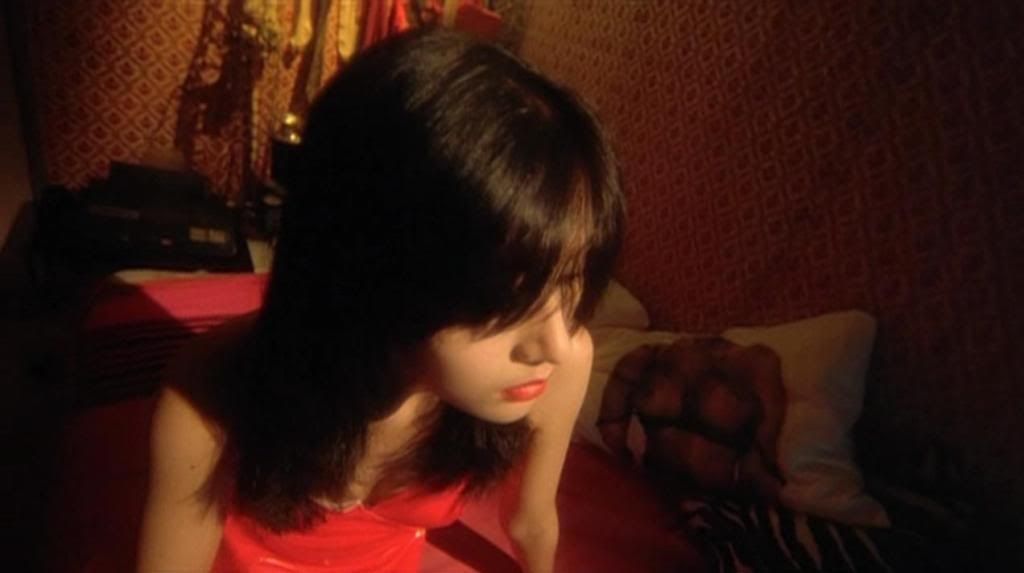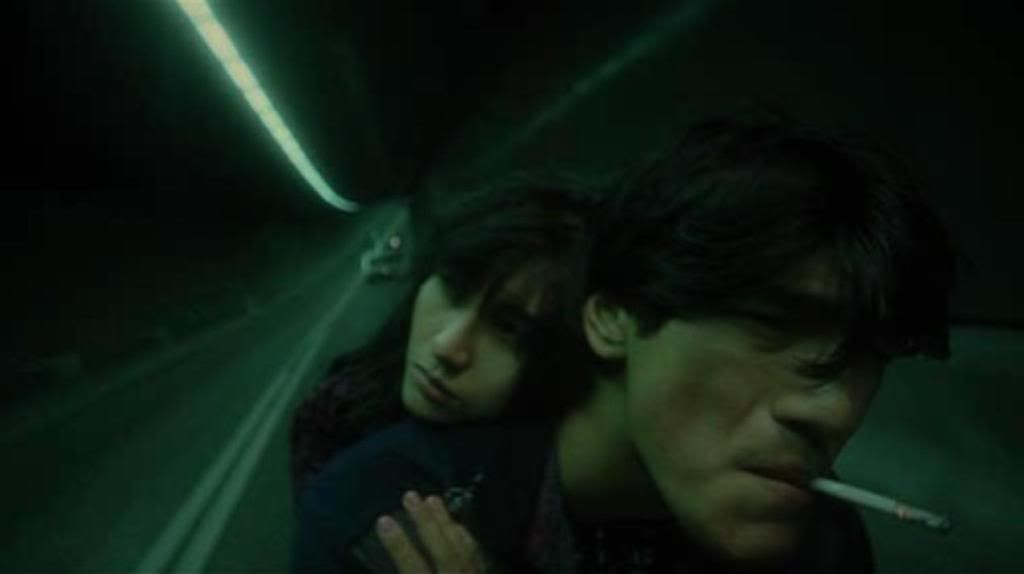
Fallen Angels is a moving, hilarious, poppy, absurd, moody film about urban disconnection and loneliness, alternately contemplative and hyperactive, filmed with the characteristic punchy stylization of director Wong Kar Wai. The city (Wong's Hong Kong home) is a peppy, colorful place, neon and bright, its colors brilliant, shining bright in the seemingly perpetual night: beautiful and dangerous. The film concerns itself with the people who live their lives almost wholly at night, shunning the daily nine-to-five grind in favor of nights packed with activity, with crime and romance and desperate attempts to connect with other wanderers of the night. In this city, it's often raining, the streets are slick and shiny, and time moves unpredictably, sometimes racing by in the blur of time-lapse traffic scenes, sometimes slowed to a crawl. The city's night is populated by a professional killer (Leon Lai) who wants to quit his job, his agent (Michelle Reis) who arranges his kills without ever meeting him in person, the mute He Zhiwu (Takeshi Kaneshiro) who spends his nights in closed stores, reopening them without their owners' knowledge and forcing passersby to partake of his wares, the emotional young woman Charlie (Charlie Yeung) who's obsessed with a guy who's left her, and the punky Blondie (Karen Mok) who just wants somebody to think she's special, to remember her.
These various drifters and loners collide off one another in the night, careening around on their oddball errands, their violent missions, their melancholy unkept dates in various smoky bars. As Zhiwu says, he's always looking to find "friends and confidants," so he "rubs elbows" with anyone he meets, which in his case usually means dragging his unwitting victims, kicking and screaming, into bizarre transactions. Running a laundromat, he forces a bum to get his clothes washed. Taking over a grocery store, he tries to convince a lady to buy eggplants — hilariously, she thinks it's improper since she's single, and what would people think? — and then saddles her with a tremendous watermelon. He keeps running into the same unfortunate guy (Fai-hung Chan) over and over again, first giving the guy a hair washing and shave under duress, then riding him and his extended family around the city in an ice cream truck, gorging them with cones and tremendous sundaes with candles flaring on top like it's a big birthday celebration. These surreal crimes are a weird way of getting attention, connecting with people — Zhiwu sees it as a kind of service, a way of making people happy in unexpected ways.
It's also a way to break through the barriers preventing communication. Zhiwu can't talk because there was an accident with expired pineapple, an in-joke based on the character with the same name and played by the same actor in Chungking Express, who was also obsessed with pineapple, and who says, as this Zhiwu does later in the film, that everything has an expiration date. The other characters in the film don't have Zhiwu's extreme communication problems, but they're similarly disconnected, isolated from one another in various ways. The killer and his partner communicate with one another primarily through technology. She faxes him maps of the locations for his missions, hand-drawn with marker, her little personal touch added to an impersonal business. Otherwise, they communicate through numbers: through the numbers of answering machine services, a common device in Wong's films, or the number of a particular song on a jukebox that the killer leaves as a message to his partner when he wants to quit. Unable to tell her his feelings face to face, he leaves a number that leads to a song about breaking up.
In the same way, he leaves behind clues for her in the apartment where he stays while on his missions. She's in the apartment before the killer, cleaning it and setting it up for him, much like Faye Wong's character in Chungking Express, rearranging the apartment of the man she loves to help him forget his ex-girlfriend. Wong films these scenes to emphasize the parallels and the disjunctions: the killer and his partner inhabit the same space in subsequent scenes, separated by time but not by space. Later, after the missions, she goes through the killer's trash, because it helps her learn about him, to feel close to someone she never actually meets face to face. And, as the killer reveals later, he knows she does this and deliberately leaves behind evidence of his actions and his personality, knowing that she'll be able to piece together information about him through what he throws away. In this way, they become closer while remaining at a physical remove; it is as close as they get to connection, as close as they get to really knowing another person intimately.

For the killer and his partner, this distance is something they try to maintain, even if they don't really want to; they pose, keeping their cool, playing their roles, even if they secretly yearn for something deeper, something more real. Towards the beginning of the film, the killer's partner says that she's not interested in any of the "friends" she visits, that it's all anonymous and impersonal for her, that these targets don't mean any more to her than the man she sics on them. She tries to live up to that image, projecting an aura of untouchable cool: her bangs combed over her forehead and hanging down into her face, nearly covering her eyes completely most of the time, as though if she hides her eyes, she can't see or, more importantly, be seen. She is, like so many of Wong's characters, an icon of cool with her rubbery fetish dresses and her bright red lips, her garters and her cigarettes, sexy and cool, remote, simmering and chilly at once. It's only in private that she betrays her reserves of feeling, masturbating violently and passionately in the empty apartment whenever the killer isn't there; in public she appears as the cold professional that her job requires her to be.
The killer is similarly haunted by emotions that don't suit his profession. He yearns, like so many other killers and criminals in the history of genre fiction, for an ordinary life, for this one last job to be his true last one; he wants to find a girl he can love, he wants to settle down. He occasionally runs into people who recognize him from a more innocent time; he wryly notes, in voiceover, that "even if you're a killer, you still have classmates from grade school around." When he meets a cheery old school friend who's about to get married, the guy tries to sell him an insurance policy, but he won't get one because it only reminds him that he wouldn't have anyone to name as a beneficiary. He's living an entirely solitary existence, with no friends, no family, no real life other than traveling from place to place, living for a day at a time in apartments scrubbed clean by his partner, killing people in a burst of gunfire and then moving on to the next mission.
The yearning for connection in this film is intense, as every character wants someone or something they can't have, while somehow remaining isolated from the people who do cross their paths. Zhiwu tries to connect with the chatterbox Charlie, a romance that seems counterintuitive but somehow perfect — a man who can't talk and a woman who can't stop pouring out her every feeling in a torrent of talk and tears — but she's still hung up on her ex and barely registers Zhiwu's presence. Blondie wants the killer, and is in fact convinced, whether rightly or wrongly, that they'd once dated and he'd simply forgotten her, but he only wants company for the short term.
Wong situates these gloomily romantic stories and characters within a glitzy, hyper city that seems to be losing its collective mind, unleashing bursts of unpredictable violence that recall the abrupt transitions from calm to bloodshed in his directorial debut As Tears Go By, or the climactic gunfight in Days of Being Wild. The overall atmosphere of slowly simmering heartache — all those shots of lonely people in lonely bars, bathed in neon glow — is thus constantly threatened by outbursts of absurdity or over-the-top violence. The most notable is a surreal but gory fight that suddenly breaks out in a restaurant around Charlie and Zhiwu, with a man named Blondie — the name of the girl who Charlie believes stole her man, though she seems to have a very different story from the Blondie who hangs around with the killer — at the center of the brawl. The sequence is frantic and motion-blurry, a frenetic outpouring of kinetic knife-fighting and screaming, streams of blood and people running desperately through the chaos.
These outbursts add to the sense of emotions flaring out of control; the city seems to reflect the turbulent confusion and desperate longings of these people, or perhaps it's the other way around. Either way, the landscape of Fallen Angels is emotionally explosive, with Wong's bold aesthetics creating the impression that the characters' feelings are being written onto the surface of the film, inscribed in every shaky pan and every over-saturated color.

6 comments:
Great description, Ed. Fallen Angels is the most quirkily bizarre of all of Wong's films to date.
This is bizarre, but I find a kind of freshness in it that few others Wong Kar-Wai have.
Excellent review. This is one of my fave Wong films for the reason, as others have said, that it is such an offbeat film. I find it interesting that originally the film was originally meant to be another story tagged onto CHUNGKING EXPRESS but Wong decided to develop it further into its own film and as a result these films are forever linked. They really do feel like they could exist in the same world and that these characters could bump into each other.
Yeah, this one is overloaded with quirky detail and eccentric oddities. It's such a wild, entertaining film despite the deep well of melancholy running through all its characters.
J.D., I didn't know that about Chungking Express but it makes total sense. As Jason and I discussed in our recent Wong convo, all of Wong's films kind of feel like they exist in the same world, with similar themes and characters who could easily cross from one film to another, and sometimes do. I love all those connections among his films.
Superb review. This is my favorite WKW film. He creates such a great atmosphere, and the ending sequence is just so beautiful.
Thanks, Bonjour Tristesse. Love your blog name, by the way, that's one of my favorite films.
Post a Comment